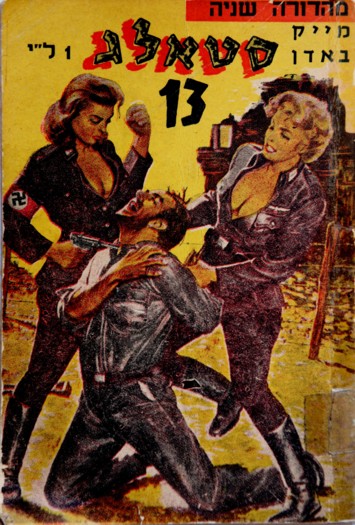|
Reviews of Recent Independent, Foreign, & Documentary Films in Theaters and DVD/Home Video
Written & Directed by Ari Libsker Produced by Barak Heymann Cinematographers, Uri Levi, Dror Lebendiger Edited by Morris Ben-Mayor Hebrew with English subtitles Israel. 63 min. 2007 Stalags, named after the World War II German prison camps, were Hebrew-language paperbacks featuring icy female SS officers sexually abusing and torturing British and American inmates. In most of the books, the victimized men would triumph, raping, and killing their captors. In the early 1960s, as horrifying revelations and first-person accounts of the Holocaust came to light during the trial of Adolf Eichmann in Israel, these books were underground bestsellers, widely read by teens, many of whom were children of Holocaust survivors. The publication of Stalags was shut down after a trial in which publishers were accused of making anti-Semitic pornography. Through interviews with Israeli scholars and cultural critics, as well as Stalag authors and collectors, filmmaker Ari Libsker, himself the grandson of Holocaust survivors, explores the complex ways that this sensationalist genre penetrated the public consciousness and continues to shape representations of Auschwitz. In 63 minutes, he manages to shed light on an enormously complicated chapter of human history. The Stalags became popular at a moment of great repression in Israeli society. Holocaust survivors made up approximately 50 percent of the population, and they faced a certain amount of suspicion and shame. Those who had emigrated before the Holocaust wondered why the survivors failed to emigrate sooner and what moral compromises they had to make to survive. Adolescents, who hungrily read Stalags, often speculated about their parent’s wartime experiences, and the subject was taboo. One survivor describes choosing to get her tattoo from Auschwitz removed. The public at once wanted to learn what had happened, and to forget. Libsker shows the challenging and disturbing ways that Holocaust remembrance has been sensationalized, sexualized, and manipulated, and through the subtleties of the many testimonies, offers compelling reasons for this phenomenon. Many of the Stalag plots were inspired by details divulged not only by the Eichmann trial but also in the 1953 book The Doll House by Yehiel Feiner De-Nur, AKA K. Tzetnik. This account of Jewish prostitutes in Block 24, the Auschwitz Pleasure Block, is considered fictional and pornographic by several major scholars, yet it is widely accepted as fact – included in the curricula of Israeli high schools and taught to students visiting the concentration camp.
It’s a rare film that analyzes an inflammatory subject on multiple levels – personal, familial, social, legal, and cultural – and takes an
approach that is both sensitive and boldly insightful. Stalags is highly revelatory not only as a study of Israeli history, but as a keen
investigation into how people cope with and process horrific and incomprehensible events.
Elizabeth Bachner
|


